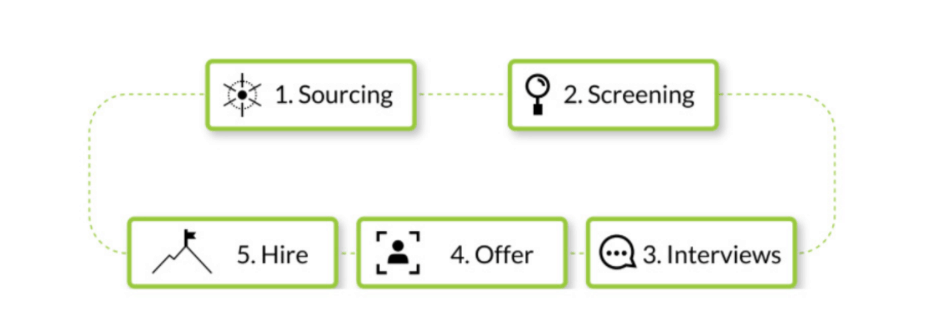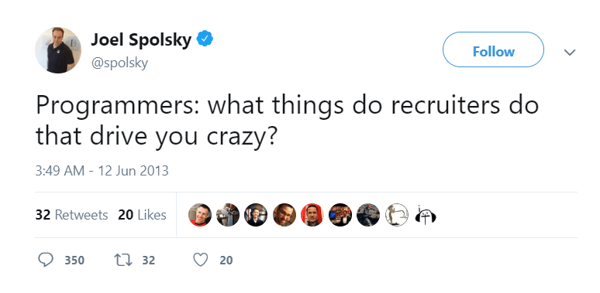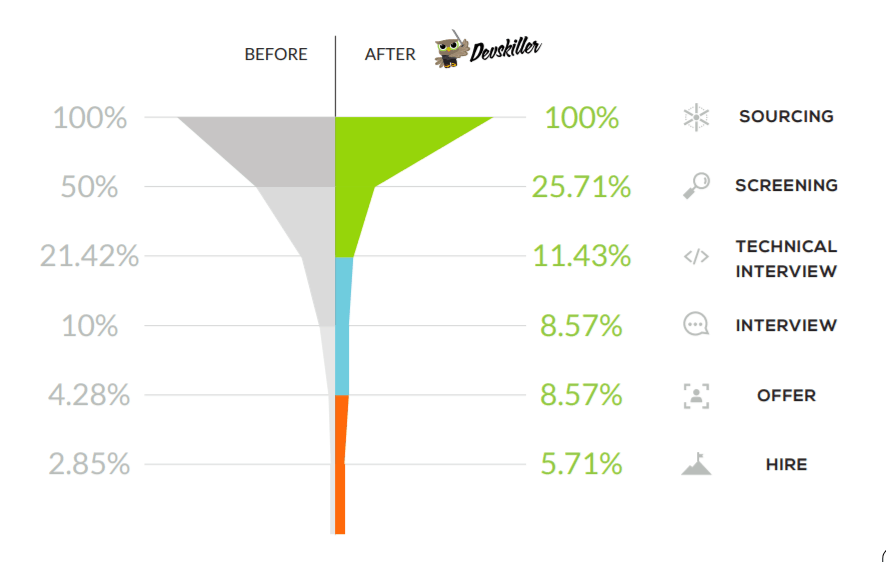
You’ve probably heard time and again that hiring employees in tech is tough. But how tough exactly is it?
As of 2023, the US labor shortage is 75%. Given the current pressures, hiring a highly skilled employee for the technology sector often feels like striking gold.
Technical recruiting is the process of sourcing, interviewing, and hiring qualified individuals for technical roles (i.e., software engineers, web developers, data analysts, etc.)
While technical interviews and assessments are crucial for evaluating abilities, a well-calibrated Applicant Tracking System (ATS) has emerged as a vital tool over the last few years.
Read more to understand all there is about technical recruiting - who is responsible for it and how to hire the best minds for your business
A technical recruiter is an HR professional who finds qualified candidates to fill technical roles within an organization. These roles typically involve information technology (IT) and engineering expertise.
They actively search for candidates through various channels, including job boards, social media, professional networking sites, and referrals. Once they identify potential candidates, they play a crucial role in managing the hiring and onboarding process for new hires.
Let's say a company is looking for a data analyst. When hiring for a Data Analyst position, a recruiter primarily emphasizes candidates' analytical abilities and experience with data, such as in research or finance. They typically review resumes for relevant keywords like "data analysis" or "statistical modeling" but may lack the technical expertise to assess proficiency in specific data tools like Python or SQL.
In contrast, a technical recruiter possesses specialized knowledge of data analysis tools and techniques. They seek candidates with hands-on experience using specific software like Python and SQL. During the screening process, they can ask targeted questions about data manipulation and statistical analysis methods. Moreover, they might even administer coding challenges to evaluate candidates' programming skills for data analysis.
In summary, while both recruiters aim to fill the same Data Analyst role, the general recruiter leans on HR skills to assess analytical prowess, whereas the technical recruiter leverages their technical expertise to evaluate essential programming and software proficiencies.
Note: Many companies utilize a two-stage interview process. The first stage might involve a general recruiter assessing a candidate's cultural fit and analytical approach. If the candidate progresses, a technical interview with a data scientist or similar technical expert will follow to evaluate their programming and software skills specific to data analysis.
As a bridge between companies and tech talent, a tech recruiter ensures the right people are hired. Here's a breakdown of their key responsibilities:
Technical recruiters need a unique combination of skills to excel in their roles. Here's a breakdown of the essential ones:
Hiring in a talent scarcity scenario is much more difficult than hiring in a talent surplus scenario.
In a talent scarcity situation, you aim to attract the best candidates. In most cases, these candidates will be passive. This means they’re already employed and won’t likely come knocking on your door.
So let's examine the elements of an efficient recruitment process for hiring employees in tech.
To avoid hiring the wrong employees, you need to create a process that can be reviewed and repeatedly optimized, like the marketing funnel.

Sometimes, companies find that in order to hire tech employees more efficiently, they need to design the whole process from scratch. This can be overwhelming, but every tweak can make a difference in the world of tech hiring.
There are many ways to optimize your interview process. One of them is to use recruitment software.
Developers and recruiters are very different from each other. As a consequence, they don’t typically get on very well.
In 2013, Joel Spolsky, CEO of Stack Overflow, crashed Twitter by asking programmers why recruiters drove them crazy. Spolsky got 350 replies, which painted a gloomy picture of the state of tech hiring.

Sadly, things have remained relatively unchanged since 2013. The relationship between recruiters and developers is still shaky.
Since hiring tech employees relies on attracting passive candidates, they must be identified through adequate sourcing techniques. The more advanced these techniques, the more unique the candidate pool you’re targeting.
Sourcing from developer-specific sites comes with several benefits:
The average developer receives numerous unsolicited outreach messages and calls. Sadly, because recruiters lack technical awareness or personalize their outreach poorly, most of these messages don’t fit the people who receive them.
While it’s important to personalize your messages as much as possible, that doesn’t mean simply inserting someone’s name into a message copy or email subject. Before approaching someone with an opportunity, you must check whether the skills listed in someone’s LinkedIn profile really match the job description.
Surprising as it is, some recruiters still confuse Java with JavaScript. The popular joke is that Java is to JavaScript as the car is to carpet, or ham is to a hamster).

Logically, recruiters and developers don’t have the same skill sets because they’d be doing the same jobs if they did. It would be unrealistic to assume that recruiters hiring tech employees have all the skills they’re hiring for.
At the same time, asking candidates random questions like “Can you tell me about .NET?” puts the whole organization in a bad light. There’s a way out of this, however. Increasing your recruiters' technical awareness allows you to source more accurately.
Some developers avoid using certain keywords in their profiles to limit the number of messages they receive. Knowing the terms they’re likely to use increases your talent pool increasing your chances of finding the right person.
For example, Instead of searching for a Cloud specialist, you can search for people with the following skills:
Becoming familiar with the terms covered in the video above also allows recruiters to be more confident during the phone screening many companies include in their process.
Similarly, if you need to hire a React Native developer, you can find resources on the web or do a technical recruitment certification course.
Work sample testing entails giving candidates a sample piece of work similar to what they would do on the job and assessing their performance. The principles of work sample testing are as follows:
Why should you use work sample tests when employing tech professionals? Because seeing someone’s skills in action is a far better indicator of their performance than their CV. What is more, work sample testing allows you to identify the developers who can walk the walk rather than talk the talk.
The number one factor you need to address when hiring tech employees is to figure out a way to bring only viable candidates to the interview stage of your hiring process.
Your aim is to limit the time your internal developers spend assessing technical skills and conducting technical interviews. Since they’re busy and their time is expensive, they should only interview people who pass the technical screening stage.
Even changing things around in the process can yield outstanding results. For example, Spartez managed to decrease the number of technical interviews by 8.6x by just moving their technical screening procedure earlier in the hiring process.

When it comes to optimizing your process of hiring employees in tech, there are two main approaches you can implement: tweak your process and use tools to streamline your process so you have more time to complete the tasks that cannot be automated
Unfortunately, two out of three recruiters lack the tools to understand the market and talent pool they are recruiting from. Complete the online reference checking to get the best possible results. Not all of these tools must be expensive, complex platforms you need to implement.
The tech recruiting landscape is undergoing a dramatic shift. Forget the days of rigid degree requirements - skills-based hiring is now king. Companies prioritize demonstrable abilities over traditional qualifications, ensuring they find the talent who can excel in the role.
But the revolution doesn't stop there. Artificial intelligence (AI) is poised to play a game-changing role. AI eliminates the limitations of traditional keyword searches and ensures exceptional talent doesn't slip through the cracks due to a poorly worded resume. As AI integration with Applicant Tracking Systems (ATS) becomes commonplace, recruiters can constantly identify the perfect fit, slashing hiring times and costs.
The future also looks bright for tech professionals. Gone are the days of completing repetitive assessments for every new opportunity. Standardized platforms will allow candidates to own their skills data, essentially creating a portable portfolio of assessments. This empowers candidates to market themselves more effectively and streamlines the process for recruiters.
As the tech workforce evolves, skills-based hiring will be the key to unlocking success for both organizations and individuals.
No, not all tech recruiters necessarily need to have a background in tech. However, there are definite advantages to having some technical knowledge in this field. The future of tech recruiting may place less emphasis on traditional technical knowledge and more on skills assessment.
No, tech recruitment is not limited to IT roles only. While IT roles like software developers, network engineers, and systems administrators are commonly recruited by technical recruiters, there are various other technical roles across different industries, such as biomedical engineers, civil engineers, financial software developers, product developers, etc.
Tech recruiting doesn't require coding mastery, but understanding common languages (Python, Java, SQL) and industry trends is key. Sharpen your HR skills (screening, interviewing, negotiation) and stay current on tech news and events to land that dream tech recruiter job!
According to builtin, the average salary for a Technical Recruiter in the US is $94,916 (as of May 2024). A combination of technical knowledge, strong HR skills, agility, and experience can set you up for competitive compensation.
Hiring developers is tough, but finding the right approach is no longer an option. Given the rapid growth of STEM jobs, it’s a necessity. Most companies hiring developers face the same pain points, which makes researching them easy. To get on the right track, follow the seven proven techniques and improve your tech hiring results.
Learn more about the employee satisfaction survey and how, as a recruiter, you can gain insights into your employees' experience and identify areas for improvement within the organization.
This article was originally published in 2020. It has been updated with new information.
Tom Winter is the CRO at Devskiller, a developer screening and online interviews-in-one platform powered by RealLifeTesting™. Madly in love with everything tech, Tom specializes in streamlining the hiring process of tech talent and data-driven recruitment. He’s also an avid conference speaker.
The tech industry has been growing for decades and the demand for technical workers isn’t...
 by Tom Winter
by Tom Winter
The war for tech talent continues to grow with no signs of slowing down.
 by Ashmita Roy
by Ashmita Roy
The shift to a candidate-driven market is the most extensive and significant development in...
 by Preethi Varma
by Preethi Varma
The tech industry has been growing for decades and the demand for technical workers isn’t...
 by Tom Winter
by Tom Winter
The war for tech talent continues to grow with no signs of slowing down.
 by Ashmita Roy
by Ashmita Roy


